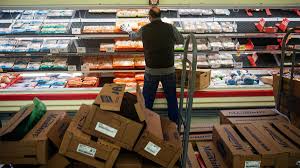A year ago, TD Canada Trust issued a report called Canadian Agriculture Begins a New Era. It was an optimistic forecast based significantly on the rise of crop prices, the demand for ethanol and growing markets such as organics, and local food.
As well, our then-Teflon economy was holding up extremely well compared to the United States, and our dollar was worth US $1.10.
Now, of course, the American financial calamity has escalated worldwide, dragging everything everywhere with it. It's predicted that real U.S. household spending will contract for five consecutive quarters.
We've gone from prosperity to uncertainty.
So it would have been understandable if the bank had second thoughts about the sector. But it's not backing down. In fact, it has just issued a special report about the state of Canadian agriculture, saying it continues to stand behind its 2007 upbeat assessment.
Here's why.
People will always have to eat, even in tough times. Increasingly, they're choosing to eat local food. However that's defined, it bodes well for sales. If farmers and farm groups adopt the mentality that they're growing food ingredients and not churning out commodities, they'll get ahead.
TD Canada Trust thinks prices will be steady. They fell — in some cases, by half or more — after spiking last year. But the bank thinks they'll make a comeback. Ethanol production will continue to create a new market and even though the harvest has been abundant, you won't find grain without a buyer for long.
However, this cheery forecast is predicated on one vital activity — increased trade with India and China.
We still have to cater to our traditional and biggest trading partner, the U.S., but things have changed. The U.S. is a mess.
Real U.S. household spending is predicted to contract for five consecutive quarters. And if the crystal ball is clear, president-elect Barack Obama will be making it harder for Canadians to peddle their harvests and production in his country.
We need to continue nurturing the U.S., but we have to lessen our overwhelming dependency on just one customer.
Why focus on China and India? According to TD Canada Trust, China is forecast to grow up to nine per cent. India could grow as much as 6.5 per cent. Comparatively, the Conference Board of Canada is ecstatic our country will grow by 1.5 per cent, claiming that's enough to skirt a recession. Hopefully it's right.
All this means Canada must market better to China and India.
But how does a farmer in, say, Elora do that? One way is to reap the bounty of bilateral trade agreements. In its report, TD Canada Trust calls on Ottawa to get busy and make these connections.
It says Canadian farmers have been slow to take advantage of the potential of China and India, which are growing by leaps and bounds above North America. The federal government needs to be in farmers' corner, and help pave the way.
Certain Ontario-grown products such as pork and soybeans have made great strides abroad, and could perhaps offer a template for development elsewhere.
Falling energy prices and fertilizer costs, and a deflated Canadian dollar further bode well for agriculture here. But it's not all rosy. The TD Canada Trust report is pessimistic about the meat sector, worrying that new red tape at the U.S. border and high feed costs will continue to stymie livestock growth and exports.
Contributing to the problem is the high regulatory cost of keeping food safe. These costs are considered the number one barrier to competitiveness, yet absolutely demanded by consumers.
Craig Bremner, TD Canada Trust's Guelph-based vice-president for agriculture, says farmers cautiously share the bank's optimism. But, he says, they are genuinely concerned about market access, particularly to the U.S.
"They're generally positive," he says. "But they're worried about the risks."
We all are. It's creating an uncertain climate . . . which makes a reasoned, optimistic outlook even more welcome than usual.


